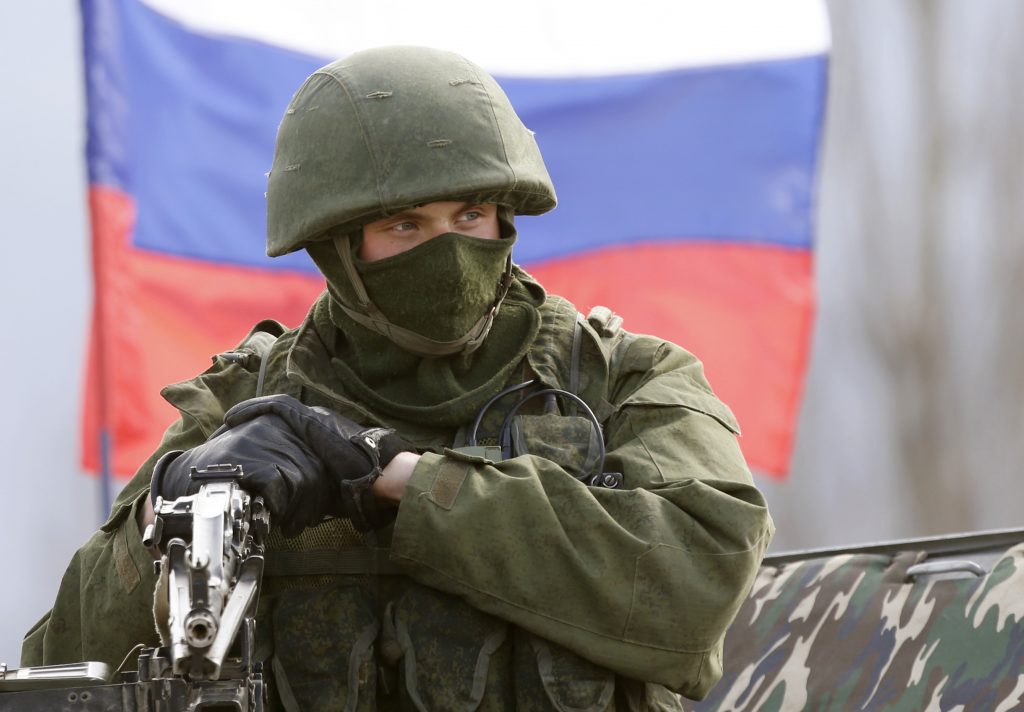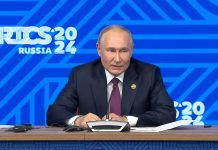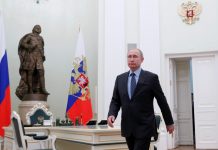By Peter Dickinson, for UkraineAlert
One of the more depressing features of the latest Russian military build-up on the Ukrainian border has been the proliferation of international headlines posing numerous variations of the same seemingly straightforward question: will Putin invade Ukraine?
I very much doubt that any of these headline writers are secret Russian imperialists or in the pay of the Kremlin. Even so, the question they pose is profoundly misleading and serves to underline the deadly effectiveness of Moscow’s disinformation tactics.
In reality, of course, Russia has already invaded Ukraine.
Putin himself has openly admitted to ordering the February 2014 invasion of Ukraine’s Crimean peninsula, while the Kremlin’s increasingly absurd denials have failed to prevent his subsequent invasion of eastern Ukraine from becoming the world’s worst-kept secret. Indeed, as the global media debates whether Putin may be poised to invade Ukraine, the war he launched in 2014 continues with around 7% of the country already under Russian occupation.
Nevertheless, as the current crisis has amply demonstrated, many international news outlets are still unsure of exactly how to characterize the war in Ukraine and remain reluctant to unequivocally identity Russia as the aggressor. Instead, coverage is dominated by euphemistic language and vague terminology that prevents audiences from understanding the full extent of Russia’s responsibility for the conflict.
This is no accident. On the contrary, deception has played a central role in Putin’s war against Ukraine from the very beginning. Ever since the onset of hostilities in February 2014, Moscow has been careful to mask its aggression by using a hybrid mix of deniable forces including conventional troops without insignia, mercenaries, and local collaborators, while at the same time portraying the ensuing carnage as an exclusively internal Ukrainian affair.
The Kremlin has maintained its policy of defiant denials despite overwhelming evidence of Moscow’s involvement. Russian soldiers have been captured deep inside Ukraine and sightings of Russian military hardware in the occupied east of the country are frequent. Meanwhile, the international investigation into the July 2014 downing of civilian passenger flight MH17 over eastern Ukraine has uncovered a treasure trove of incriminating detail that leads directly to the Russian Armed Forces.
More recently, Russian nationals who occupied leadership positions during the early stages of the war have provided damning first-hand accounts of the Moscow-led attack. Alexander Borodai, who has since gone on to become an MP for Putin’s United Russia political party, has confirmed that he was replaced by a local figurehead as prime minister of the so-called Donetsk People’s Republic in August 2014 specifically in order to hoodwink the outside world into believing Kremlin propaganda about a “Ukrainian civil war.”
While very few people have been entirely convinced by Russia’s ruse, it has nonetheless served a number of important purposes for the Kremlin. By officially denying any involvement and keeping the conflict firmly within the gray zone, Moscow has been able to downgrade international reaction and significantly reduce the economic and geopolitical costs it would otherwise have expected to encounter in response to a more conventional war.
The Kremlin’s blanket denials have also enabled Russia to participate in international observer missions of the conflict zone while portraying itself on the diplomatic stage as a potential mediator rather than an active participant. This has had disastrous consequences for efforts to end hostilities and makes it almost impossible to reach a sustainable settlement. How do you make peace with a country that refuses to admit it is waging war?
What Putin is currently threatening is not the invasion of Ukraine, but rather the escalation of an invasion that has been underway since February 2014. The fact that this needs to be stated after almost eight years of Russian aggression tells you all you need to know about the remarkable success of the Kremlin’s information war in distorting international perceptions of the conflict.
Russia’s weaponization of disinformation should provoke some serious soul-searching in newsrooms around the world. All too often, international coverage of the Ukraine conflict appears to have prioritized objectivity over truth, with report after report uncritically quoting obvious Russian lies in the name of journalistic balance. The intentions of those involved may have been entirely honorable, but their efforts have unwittingly served to enable further Russian aggression against Ukraine.
With the prospect of a major European war now looming over the continent, this needs to change. In the coming weeks, the international media can make a significant contribution towards peace by abandoning ambiguity and accurately portraying the current invasion threat as part of a far larger ongoing Russian war against Ukraine. Almost eight years after Putin’s invasion first began, it is high time to disarm his information weapon.
By Peter Dickinson, for UkraineAlert
Peter Dickinson is Editor of the Atlantic Council’s UkraineAlert Service.
The views expressed in UkraineAlert are solely those of the authors and do not necessarily reflect the views of the Atlantic Council, its staff, or its supporters.





